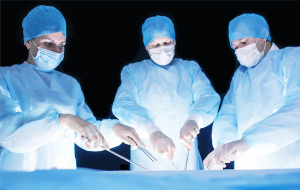by
John W. Mitchell, Senior Correspondent | November 07, 2019
Patients treated by on-call surgeons working 12-hour shifts for emergent appendicitis go home sooner and incur lower costs than under a traditional 24-hour surgical call model, according to a research team from Texas Tech University Health Sciences Center (TTUHSC) that presented their findings at the 2019 American College of Surgeons Clinical Congress in San Francisco last week.
Dr. Sharmila Dissanaike, professor, and Peter C. Canizaro, chair of the Department of Surgery, told HCB News that with growing volumes and equity of emergency surgery cases, the traditional 24-hour call model was no longer serving patients, surgeons or the medical center very well.
“Asking surgeons to work a full day, take overnight call and then work the following day is like asking them to work two full-time jobs, back-to-back," said Dissanaike. “Going to 12-hour shifts was the most feasible solution. We’ve turned this common condition (appendicitis) into an outpatient procedure, as the patients can be discharged home from the OR.”
The study involved a retrospective review of patients admitted with acute appendicitis from September 2017 to June 2018. This coincided with when the health center transitioned from the traditional 24-hour call model to acute-care surgery (ACS), in which an acute-care surgeon is in the hospital for a 12-hour shift. The review did not include trauma and other emergent surgical patients at the Level I facility.
"We found a decrease in perforation rates of appendicitis with the acute-care surgery (ACS) model. Although it wasn't the original intention of the model we created, we also found a decreased hospital length of stay, which has a trickle-down effect of having a decreased cost," said Dr. Robyn Richmond, associate program director for the general surgery residency program at TTUHSC. "With the ACS model, we are getting patients to the operating room faster, so they're in the hospital a shorter amount of time, which, overall, results in decreased costs."
The researchers say this is the first study of patient outcomes comparing the 12-hour ACS and traditional staffing models head-to-head.
According to Dissanaike, their findings support a growing body of evidence in support of the 12-hour ACS model. She added that while surgeon satisfaction was not measured, "none of us would want to go back the old system (the 24-hour model).”
Currently, faculty surgeons are helping to cover the shifts. But these responsibilities will lessen as the department hires additional surgeons to work in the 12-hour system. The researchers also plan to conduct a multivariable analysis to determine if other factors may be linked to the better patient outcomes and lower costs.
Back to HCB News
